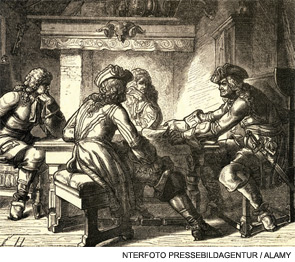
An army has a general. An orchestra has a conductor. A basketball team has a coach. What does academic medicine have for its members? The answer is mentoring committees. That, dear friends, is why I am concerned for the future.
For those of you who are unfamiliar with the term, a mentoring committee is a group of faculty whose job is to guide and advise people early in their career, whether they are house staff, fellows, or newly minted assistant professors. As usually constituted, a mentoring committee is a diverse group—clinicians, clinical investigators, and basic investigators—with the ensemble of interests and talents designed to provide a range of viewpoints to help the trainee make better career choices. A mentoring committee does not supplant the mentor. Rather, the committee facilitates the choice of the mentor, monitors progress, and otherwise assures that the youngster’s career hums along on the road to success.

Sometimes, a group can provide a unique structure to make decisions or accomplish important goals. A group can even have a name that inspires confidence and symbolizes strength: brain trust, tribal elders, war council. Does “mentoring committee” have the same oomph? Is it right vehicle to forge the next generation of leaders?
How Should Medicine Be Mentored?
I would not have been writing this series if I was convinced that the direction of current training and its foundation in committees is the right one. Like many older (and old-fashioned) people, I like the bygone days where the lines of authority were clear and direct and the mentor functioned as a head coach. I question whether a committee diffuses responsibility and can confuse young people with mixed messages as to who is really in charge. Furthermore, with the burden of documentation and arcane practices like 360-degree evaluation, a committee adds a layer that can try the soul.
I often sit on mentoring committees. I am always happy to ponder the different ways to train a fellow but, in my heart, I believe that everyone during the fellowship years should tackle a major research project. My preference, of course, is to have the fellow get his or her hands dirty in a laboratory, the kind with test tubes, pipettes, and whirling centrifuges.
Why this belief? Serious research is a challenge that teaches and demands discipline, fortitude, and focus. By engaging in research, a fellow learns to be creative and innovative and can acquire skills that are valuable whatever the eventual career path. Ultimately, research teaches the trainee to think, and thinking is good.
In my opinion, there is no substitute for the rigor of science to expand the brain and establish the synaptic connections that will underpin any endeavor in medicine. The laboratory is the practice field and the experiments are the drills that build confidence and deftness for the serious challenges ahead—whether in the clinic, laboratory, or administrative suite.
In today’s world in the United States, parents encourage, push, or prod their children into activities motivated to build character. Whether the children kick soccer balls, toot clarinets, or spin themselves silly doing somersaults and cartwheels, the goal is the same—to create a strong work ethic. As the parents disgorge their children from the minivans, they also tell them to obey the coach and follow instructions. Few children will ascend the heights of musical or athletic stardom, but the belief is strong that these pursuits will make a better person, ready to take on the real world.
Why, then, the reluctance to have trainees take on the challenge of research and entrust themselves to a real coach for two or three years? If I go to a mentoring committee, then that is my recommendation: Go work with the best researcher you can find. What happens when the fellow proposes a retrospective chart review of some condition or a smattering of courses in biostatistics? I know that I communicate less than a full measure of enthusiasm. Who knows? I may sigh, wince, or grimace; my body language is not giving a positive sign.
One-to-One Relationship Key
In academics, we are open minded and eclectic and respect the work of our colleagues. But when it comes to training—which is, after all, a version of parenting—we all have our way of doing things. Furthermore, when we are in the role of mentors, there is reluctance to have committees meddle with our approach to training. The mentor–mentee relationship is a classic dyad that probably works best when the mentee embraces the vision of the mentor and dives into the work with gusto. I fear that a mentoring committee can weaken the bond of mentor and mentee and, accordingly, the whole training experience. If our faculty is as good as we say it is, why do we need a committee to make sure they are doing their job? As they say, too many cooks can spoil the broth.
Just like the player–coach relationship, the mentor–mentee relationship is filled with tension, and often there is strife. Most mentors think that their mentees don’t work hard enough and most mentees think that their mentors are unrealistic in their work demands. A lot of chafing and fuming goes on. These disagreements are fundamental to training and, indeed, it is essential for both sides to reach an accord on how to get the job done. Negotiation is part of the process that is hard for a committee to manage.
Academic medicine has to develop a new generation of strong leaders, and to get there we need dynamic coaches who can inspire. Given the challenges faced by medicine today—falling reimbursements, stagnant research funding, and burdensome regulations—smart, tough, and brave leaders at the helm are more essential than ever.
Indeed, we need the academic equivalents of University of Memphis basketball star Joey Dorsey: bruisers and beasts, big people to take up space in the middle, who can intimidate with sharp elbows and know how to defend and how to score. Would Joey Dorsey have played better with a mentoring committee on the sidelines instead of fulminating presence of John Calipari, the men’s basketball coach at Memphis? What if the committee had said to Calipari to lay off Dorsey for not playing hard enough? After all, weren’t 10 rebounds enough, especially since the Memphis team was cruising into the NCAA final?
Just like in sports, success in medicine demands passion and competitive fire. A coach can instill those traits. Do you think a committee can?
I know what I think. I want to know what you think.
Dr. Pisetsky is physician editor of The Rheumatologist and professor of medicine and immunology at Duke University Medical Center in Durham, N.C.



